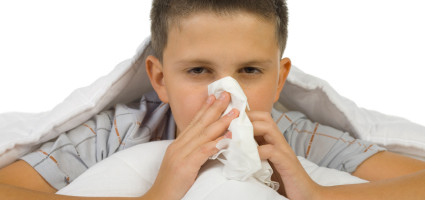When it comes to the health of your kids, the common cold can have a major impact. Most kids develop colds frequently, as they are easily transmitted from person to person and through contact with infected particles on surfaces and in the air. While a cold is not typically something to worry about, there are a few complications that can occur and situations in which you should see your doctor.
Cold Signs & Symptoms
The main symptom of the common cold in children is nasal congestion, typically accompanied by nasal discharge that is yellow, green, or clear in color. For the first three days, a fever is also common. Other potential symptoms include a cough, sore throat, sleeping issues, lowered appetite, irritability, enlarged lymph nodes, and redness and swelling in the lining of the nose.
Potential Complications
While most colds do not lead to complications, a few are possible. The common cold can lead to a bacterial ear infection in some children, typically indicated by an ongoing fever. Colds can also aggravate asthma or cause wheezing. If your child’s nasal congestion does not get better after ten days, he or she may have a bacterial sinus infection. Finally, colds can also lead to bacterial pneumonia, indicated by a fever that persists after three days, rapid breathing, and a cough.
Treatment & Prevention
When treating the common cold, most medications are not recommended for children under age six. Acetaminophen can be used for children three months and older. Ibuprofen can be used for children over six months along with other medications, such as decongestants, expectorants, cough medicines, and antihistamines. However, the best way to treat a cold is to simply prevent it. You can prevent the common cold with frequent hand washing, limiting contact with those who are sick, using household cleaners that attack viruses, and taking vitamin C.
When to See Your Doctor
Although most colds will go away on their own, you should see a doctor immediately if your child will not drink for a long period of time, has serious behavior changes such as lethargy or irritability, or has trouble breathing. Other causes for concern include a fever higher than 101 degrees F for more than three days, red eyes with yellow discharge, nasal congestion that does not get better or gets worse over two weeks, and signs of an ear infection such as ear pulling and pain.
The information and content on our website should not be used as a substitute for medical treatment or advice from your doctor.






